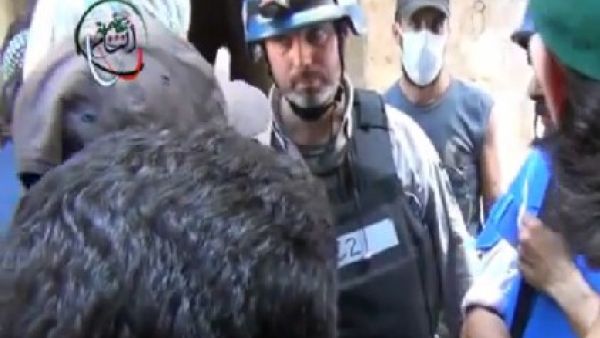UN chemical weapons inspectors in Syria met and took samples from victims of an apparent poison gas attack in a rebel-held suburb of Damascus on Monday after the UN team themselves survived a sniper attack that hit a vehicle in their convoy.
A Syrian doctor told Reuters from the suburb, Mouadamiya, that investigators from the United Nations had crossed the frontline from the center of the capital.
The UN said one vehicle in its convoy had been crippled by shooting by "unidentified snipers," but mentioned no injuries. Their arrival meant whoever fired had failed to turn them back.
"I am with the team now," the doctor who uses the name Abu Karam told Reuters by telephone from rebel-held Mouadamiya.
"We are in the Rawda mosque and they are meeting with the wounded. Our medics and the inspectors are talking to the patients and taking samples from the victims now."
Wassim al-Ahmad, an opposition activist, said members of the Free Syrian Army umbrella rebel organization and the opposition's Mouadamiya Local Council were accompanying the inspectors on their tour of the suburb.
"The inspectors are now examining victims being treated at a makeshift hospital in Mouadamiya and are taking blood samples from them," Ahmad said.
Activists say at least 80 people were killed in Mouadamiya when the district was hit with poison gas at 4:00 am on August 21. Three other rebel-held districts – Irbin, Ain Tarma and Jobar – were also hit in attacks that killed hundreds of people.
An opposition activist said a large crowd was growing of people eager to air their grievances to the UN team. There was a plan for the experts also to take samples from corpses.
The inspectors pressed on despite the sniper attack that disabled the lead vehicle in their convoy, forcing them to turn back for a replacement car.
"The first vehicle of the Chemical Weapons Investigation Team was deliberately shot at multiple times by unidentified snipers in the buffer zone area," a UN statement said.
"It has to be stressed again that all sides need to extend their cooperation so that the team can safely carry out their important work."
Syria had agreed on Sunday to allow the inspectors to visit the site. But the United States and its allies say evidence has probably been destroyed by heavy government shelling of the area over the past five days. It said the offer to allow inspectors came too late.
The six-car convoy of chemical weapons experts wearing blue UN body armor was accompanied by a car of security forces as well as an ambulance.
President Bashar al-Assad, who has been fighting a two and half year revolt, said accusations that his forces used chemical weapons were politically motivated and warned the United States against intervening in his country.
"Would any state use chemicals or any other weapons of mass destruction in a place where its own forces are concentrated? That would go against elementary logic. So accusations of this kind are entirely political," he told the Russian newspaper Izvestia in an interview.
"Failure awaits the United States as in all previous wars it has unleashed, starting with Vietnam and up to the present day."
The United Nations said Damascus agreed to a ceasefire while the UN experts are at the site for inspections.
Activists in Ghouta said that rebels had also agreed to halt operations and several brigades would provide protection to the visiting UN team.
But as one activist spoke to Reuters by Skype, the sound of exploding mortar shells could be heard in the distance – highlighting the dangers and difficulties inspectors face as they try to investigate.








